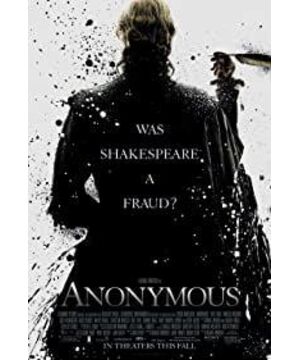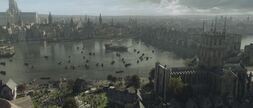"Anonymous" (2011) is probably the only movie so far that I can watch repeatedly, and I am still moved by the end. Except that the male protagonist is a gorgeous literary uncle (Rhys can actually be beautiful like this), as a superficial face control all the way to the black; probably the most moving me is this specious history. Although "Anonymous" was called an exquisite lousy film in the Times commentary at the time, it never tires every time it returns, and I think there should be more of this kind of film that requires a little brain to understand in the film industry. The film unfolds from the theater, and Derek Jacobi brings you a story of the poor three generations of literature and art in the 17th century. From the beginning of the story, time passed to 5 years ago, and then back to 40 years ago in the memory of the Earl of Oxford. A play within a play is a technique that I am very interested in. It's not about how good the movie is or how high my evaluation is. On the contrary, comparing it with many good movies I have seen, it really doesn't have much chance of winning. But for some reason, tossing and turning, I love it the most. It's like a small object obtained by accident, although it has blemishes and mottled colors, such a stunning glance evokes lovesickness; therefore, no matter how rare it is later, Wushan is not a cloud. At the climax of the film, the real author wrote a drama to control public opinion in order to resist the slanders around Elizabeth. The scene incited the audience, and an angry crowd rushed to the palace, demanding to condemn the traitorous officials. Like this section, it highlights the charm of drama. And this is adapted from historical facts. Elizabeth reused Essex as a military minister for many years, and Essex eventually stepped across the border and became the queen's political opponent. Ambitious, he assembled the rich and powerful to plan a coup. On the night before the coup, he invited the nobles to the theater. This play is "Richard II". From a historical point of view, Richard and Pauline Brooke are the queen and Essex in the play. In the initial rehearsal, in order to avoid risks, Shakespeare cut out the deposed scenes. And it is said that on that night, the theater restored the deposed scene that was previously deleted intact. And what the movie says that the real Shakespeare is Elizabeth's illegitimate son, the Earl of Oxford, is not purely false. Some scholars in the West really tend to regard the Earl of Oxford as the true original author. And the sentence in the film All art is political, otherwise it would just be decoration. It also explains the reasons for publishing under Shakespeare's name. William Shakespeare grew up in a low-income family with illiterate parents and children. It is hard to imagine that he could accurately use the rhythms and rhymes in poems. Then he became an actor in a theater troupe, and later began to write scripts. But there is no evidence that these scripts were written by him. When his 11-year-old son, Hamnet, died, there was a "Hamlet" that everyone could come to say To be or not to be. Very confused, if the script was written by someone else, why should it be named after his dead son? Shakespeare had never been in contact with the royal family, how could he understand the details of the royal family so much. Even if it is imagination, how can thinking break through the limitations. Just like those rich people who don’t know what “Wal-Mart” is, we have no way of understanding the lives of people in the upper class. Moreover, his script involves reaction, everyone has seen this, but he has never been imprisoned or tortured. What I can't understand the most is that in his will, he left all his property to his widow, but he didn't mention a word about his work. Maybe it's because I, as a writer, pays special attention to my own achievements, how can I let my works be scattered in the world without making any arrangements. Since I fell in love with Ben Whishaw, I have fallen into the shackles. I can’t say whether I fell in love with this movie because of Shakespeare. Just because I entered the play, as a person who is also a creator and loves words, I can't help feeling that people from hundreds of years ago can make modern people so remember. How amazing. And the one that moved me the most was what the Earl of Oxford said at the end of the film: "When I inherited my earldom I was one of the richest men ever to breathe English air. And at last breath, I shall be one of the poorest. Never a voice in government. Never a sword raised in glorious battle. Words, merely words shall be my sole legacy. "From the perspective of movies only, even the writer doesn’t even think that he is a successful person at the end of his life. However, this only legacy, the ink writing on the withered manuscript, interprets love and grievances, ambition and imperial power, illusion and Lies, longing and hesitation, conspiracy and betrayal, and thinking about human nature (seemingly distant, but in fact it is our life itself), mixed with the last refinement and glitz of the Tudor dynasty, have been remembered by future generations for 400 years, and then accompanied by The audience’s breath will last until the day the world perishes. Huang Biyun said: “(Don’t) say that great literature is immortal. Literature is of course rotten. Literature is as rotten as their social material, but the situation that people can have is so limited. We are back to where we were before, immortal. "If you want to peek into Shakespeare’s life, the last work you can’t ignore is his last work. After "The Tempest", Shakespeare stopped writing. Like Prospero who gave up magic in his pen, he gave up hatred and honor. , Gave up everything he had, and gave up all the troubles of the mortal world. "The Tempest" is his last personal biography, like an exhortation to himself, only by pouring the inner voice on paper, the inner heart can be calm. In 2010, The play "The Tempest" was staged at the Globe Theater. In the play, Prospero talked about the perishability of life—everything in this world will eventually disappear, including—unprecedented, he added—The great globe itself. Here, the clever thing is that The Globe not only refers to the earth, but also the name of this theater-the well-known Globe Theater. This adaptation subtly connects the performers on the stage with the audience off the stage. "All of our shows, all of these things that we've created here will disappear, they won't be around anymore." are made on, and our little life is rounded with a sleep.
View more about Anonymous reviews











